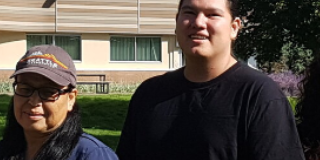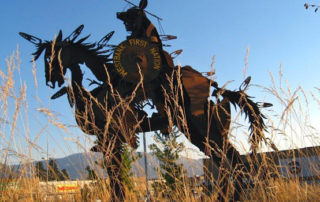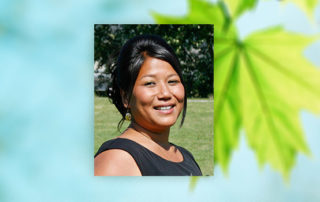FIRST NATIONS: SUCCESS STORIES
Student Spotlight: Sue Ellis, Akisqnuk First Nation
Sue Ellis, Finance Supervisor, Akisqnuk First Nation.
Why did you sign up to take the Certificate in First Nation Taxation Administration Program?
The role of tax administrator fell into my lap after our Sr. Finance Officer left. I didn’t know what I was doing the first year and am so thankful for all the help that I received from Nicole Casimel at TAS, Marie Potvin and Tracey Simon at FNTC. I could NOT have done it without these ladies’ help. So for others out there that are thrown into the role, there is so much help available from the First Nations institutions…USE IT! That’s what they are there for.
What are your thoughts on the program and your biggest takeaway?
- There is help out there! Take advantage of all the expertise to better your First Nation.
- The first class laid out the foundation of why First Nations are where they are, which is very eye opening from an outsider’s perspective.
- There are many opportunities on the horizon for First Nations to exert their jurisdictions and start collecting more of their own revenues. There were many laws that we worked through and now I have my own templates, briefing notes, and notices already done for when those opportunities arise in my community. Thanks for preparing us in advance!
- Share information with other First Nation communities and stop trying to re-invent the wheel. It’s great to hear about where other communities are from starting out with no laws, to those that have numerous ones already in place and are having successes.
- The Tulo Centre has great instructors that are super knowledgeable and passionate about the subject. Also, they were very entertaining, down to earth and understanding.
How will your First Nation benefit from you having this certificate?
If there are new opportunities that our First Nation pursues, I will have the confidence and knowledge to address the taxation perspectives. I will also have more confidence to speak up about future developments, ask questions and disagree with the project if I don’t think that it is financially feasible.
Any final thoughts?
If possible, every First Nation should have one of their staff attend this course as it teaches them not only about the taxation opportunities, it allows them to meet people from other First Nations to share ideas and knowledge, which is truly valuable. It also shows them what is available for help and maybe it will get them thinking about ways they can help their First Nation with new economic opportunities and how important it is to plan for the future. Thank you so much!
Sue Ellis (far left) shown above with her classmates in front of Thompson Rivers University.
Certificate in First Nation Tax Administration
The Certificate in First Nation Tax Administration provides the knowledge and skills needed to design and operate a taxation system using the powers outlined in the First Nation Fiscal Management Act. It examines how First Nation government tax policies can be used to promote economic development and finance and build infrastructure. The program pays particular attention to communicating tax policies and laws to Chief and Council and taxpayers. Other skills developed in the program are establishing legal framework, managing the assessment and appeal processes, setting tax rates, administration – collection, enforcement and resolving disputes and more.
The program is led by industry experts and is intended for First Nation property tax administrators, persons working for First Nations in economic development and/or property taxation, persons with interest in the field, persons working for firms desiring to do business on First Nation lands and persons working for other governments with an interest or requirement to work with First Nation property tax systems.
During this accredited certificate program, 8 courses are completed in one-week increments on campus at the Thompson Rivers University. The courses are:
- Introduction to First Nation Taxation
- Assessment and Assessment Appeals
- Establishing First Nation Tax Rates and Expenditures
- Administration – Collection, Enforcement and Dispute Resolution
- Service Agreements
- Introduction to Infrastructure Financing
- Infrastructure Finance II.
The FNTC has developed a student bursary program to provide limited financial support to individuals working in administration for First Nation governments in Canada to attend the accredited certificate program.
If you or someone you know is interested in this program, we encourage you to apply by visiting tulo.ca/register, or by contacting the Program Coordinator, Lindsay Risling: lrisling@fntc.ca
Student Shoutout:
What is your name?
Alanea Holmstrom, Osoyoos Indian Band member.
Why did you sign up to take this certificate program?
I signed up for Tulo because I want to grow and learn in my career, I started with the Osoyoos Indian Band (OIB) as a Data Entry Clerk. There was a position that came up in the Lands and Taxation Department.
Thoughts on the program and your biggest takeaway?
I truly appreciated the program and the way it was set up. There is so much support in assisting people who would like to grow in their career and learn something new in a positive environment. In addition, the level of support from the hotel rooms, to the bus rides and the meal cards made the course that much easier to navigate. The classroom setting is very supportive, and the lessons are delivered in a way that assists in learning how to facilitate discussions.
How will having this certificate change your job/career?
This certificate has assisted me in developing a career and making this more than a job. From the discussion in class to hearing what other First Nations have been able to accomplish once you know your rights and jurisdiction. It is very inspirational and I came back highly motivated to make a difference in my own community. I feel as though Tulo gave me the strong foundation I needed to begin making a difference. I was entirely new to taxation and had no previous experience. There is no question in my mind that I would not have been able to complete my work and stay on schedule according to our laws if I did not have the Tulo support. The timing of each of the courses really set me up for success because they coincided with the tax cycle.
I am currently working as a Tax Administrator with the Osoyoos Indian Band. I am working on developing a strategic community plan which will lead into a long term capital planning for the future of OIB. I see many areas to improve my community and the means to make it happen.
How will your First Nation benefit from you having this certificate?
This certificate program has given me a ton of amazing ideas to inspire the members. I see taxation as a way to build communities, I see the value I believe this is how we will get back to our roots as First Nations. Taxation is all about facilitating community with everyone contributing equally to sustain our institutions and our future.
Any final thoughts?
I really enjoyed the program and I am looking forward to taking any new courses. I really enjoyed the learning experience and to hear presentations from so many different perspectives, and presenters.
Tulo student profile: Annamarie Demchuk
Annamarie (Morin) Demchuk, class of 2018 valedictorian, Enoch Cree Nation tax administrator, is a member of the Enoch Cree Nation located just outside the city of Edmonton, AB. She has a strong background in education and business and holds an MBA. Anna strongly believes in lifelong learning, having recently graduated from the Tulo Centre with a Certificate in First Nation Tax Administration. She was named class valedictorian by her fellow cohort members and was proud to walk hand-in-hand with her peers during the graduation ceremony. Anna is also currently enrolled in the Tulo Centre’s brand new Applied Lands Management certificate program and is on her third course out of the eight courses required to graduate from that certificate program.
Clearing the Path recently had the opportunity to sit down with Anna to learn more about her experience in the First Nation Taxation certificate program.
How did you first learn about the Tulo centre and its programs?
I became aware of the Tulo Centre and the FNTC many years ago. My brother Don, who was the CEO for Enoch Cree Nation’s economic development department at the time, had a vision to ensure we had a complete department with a focus not only development for our nation, but also some missing pieces for us to move forward with, such as taxation, infrastructure and planning. At that point, we began our journey to learn as much as we could to ensure proper development for our nation.
Enoch was very progressive in the 70’s and was actually one of the first communities to implement taxation under section 83 of the Indian Act. Later, the First Nations Fiscal Management Act (FMA) passed royal assent and the FNTC was created to develop a thorough taxation regime that could be used by all First Nations in the country to exercise their rightful jurisdiction with a taxation regime.
How does your experience at Tulo relate to your work at Enoch?
The taxation program at Tulo has given me more insight and a strong educational foundation to ensure that we’re fully implementing all jurisdictional powers available to us through the FMA. For example, in learning about revenue options available under the FMA and in working with the FNTC, our nation became the first in Canada to receive approval to recover payments-in-lieu-of-taxes (PILTs) for an RCMP building located on our lands.
Enoch is adjacent to the City of Edmonton in a situation very similar to that of Westbank First Nation and the City of Kelowna. Enoch and Westbank met several times to exchange knowledge and information. Through those visits, Enoch decided they could develop a better tax system with the help of the Tulo taxation program. I had been working in our tax department with our legal counsel since 2010 implementing taxation through s 83 of the Indian Act. Then in 2014, we decided we wanted to join the FMA so at that time, our former leadership enacting a BCR to be scheduled to the FMA, and that felt like the most opportune time to take the First Nation Taxation certificate program.
Prior to taking the program, I was doing things the hard way where I was developing my own drafts of laws and going through a lawyer and paying their legal fees but with First Nations Tax Commission, they have already went through all this stuff and have made templates, standards and samples available so it saves you so much in time and legal fees. I thought that was really helpful.
We’ve built up Enoch’s tax regime and now within two years, our tax revenues and the services we are able to provide are comparable to our reference jurisdiction, which is the City of Edmonton. It’s given us a lot of confidence to know we can do this. It’s very powerful.
What has been the most valuable aspect about the program for you so far?
While at first I was a little afraid to go back to school; in the end I am very glad I did. A valuable learning experience for me has been that you are never too old or too educated to go back to school. I have learned so much more about implementing a comprehensive tax regime for Enoch with taxation laws that have to be abided by regardless of what elected leadership is in. New leadership every two years can create instability and uncertainty in many communities, but now we at least have our tax laws in place that provide procedures, transparency, and proper accounting controls to ensure taxation revenues will be spent in a manner consistent with our laws. Our current leadership is proud of me for completing the taxation course, with honours, and is grateful for the growth taxation has provided to our community. We now have comparable tax rates to our reference jurisdiction, the City of Edmonton, which is because we’ve done our due diligence and taken the time to fully understand the taxation regime. This is a result of the education I gained from Tulo that provided me invaluable taxation knowledge and experiences.
Another aspect I appreciated is that Tulo brings students together (both First Nations and non-First Nations) from many different provinces all over Canada. Through the cohort model, we are able to develop long-term friendships, share many of our concerns, similarities, and give each other advice, if asked and needed.
How does that taxation fit into your community’s future?
Enoch’s taxation regime will help us ensure that as we develop, we have proper property taxes for commercial and residential developments. As we grow, we have learned that tax revenues are so important. Those revenues can help fund capital infrastructure projects and make your community a better place to live in today, and more importantly for our future generations to thrive.
Do you have any final thoughts?
I see taxation as an incredibly helpful tool to empower many bands to take control of their jurisdictional powers and help their communities.
I am very grateful to all of the people involved in the overall development of the Tulo programs. I would like to also thank our previous leadership at Enoch, along with Ernest Jack at Westbank, and Trenton Paul at FNTC for their support and encouragement for Enoch to become scheduled to the FMA and work with the FNTC. Through their support, Enoch has been empowered to understand our tax regime better and fully implement it as a result of the Tulo program.
“Information and Education is powerful, if used the right way” – HIY HIY
Westbank First Nation: Using property tax revenues to build a vibrant future
Recently Clearing the Path had the opportunity to meet with Ernest Jack, surveyor of taxes for Westbank First Nation (WFN) to discuss how property tax revenues are helping the First Nation achieve community visions. Westbank First Nation has a long taxation history under a local government services model used by many municipalities. Adapting this local government services model into a hybrid model proved a wise decision and WFN is now able to direct tax dollars to services and infrastructure that offer the most benefit to all members of the community.
In 1990, taxation generated $750,000 in revenues. They currently estimate revenues for the 2017 – 2018 taxation years will approach $14 million. One of the pivotal points for change in the community was the decision to sign a self-government agreement in 2005. This helped to increase tax revenues as the Self-Government Agreement provided certainty to investors with clear guidelines regarding business practices, leasing agreements, tax rates, and what they can expect in return from WFN in doing business.
In 2005, Westbank’s assessments on commercial values were $39 million; commercial values now top $380 million. Today, WFN is currently rank 58th among BC municipalities with a total assessments worth of $1.6 billion. They have over 400 businesses on WFN land including Home Depot, Canadian Tire, Walmart, Superstore and three Tim Hortons. The Westbank First Nation also has a strong aboriginal sector of 60 businesses including many artists, a trucking company, general construction company and restaurants such as Kekuli Café Coffee and Bannock.
The core to successfully administering the taxation revenue lies with WFN working closely with the Westbank First Nation Tax Advisory Council. The advisory council reviews tax administration budgets, including recommendations to the Chief and Council regarding tax laws and amendments. They also play a leading role in the preparation of the local government services budget, which sets property taxation rates and distribution of tax dollars. The council prioritizes funds towards worthwhile endeavours in education, public works, recreation, programming, development and administration.
Recent projects include new sidewalks, the sports court, repaving, water system upgrades, the Lakeside trail, landscaping and equipment. However, the crowning glory is the new Youth Centre opened in December 2016.
The concept for the Youth Centre began in 2012. Rapid community growth filled the gymnasium, soccer fields and ball parks to capacity. Demographics indicated a young Westbank membership, and many young families in the area. The Chief and Council approached the Advisory Council and proposed the new facility to accommodate the young demographic. They recognized an investment in youth forges strong leaders, creates a healthy community, and guides the Nation and all residents towards its long-term goals.
The 13,000 square foot Youth Centre is now a place for youth to explore leadership opportunities and enjoy a healthy, active lifestyle. The $5.5 million facility features a learning garden, outdoor kitchen, amphitheatre and green heating and cooling systems. Eventually, the centre will house ten offices and multi-use areas. It will also provide youth programming and mentoring space for Elders to interact with youth.
Of course, the core of a successful, growing community relies on other considerations too. Planning, development, maintenance, health and safety are also important. The upcoming budget includes monies to safeguard the environment, develop the lands wisely, and service the infrastructure that provides WFN residents with comfortable lifestyles. An additional $1.9 million provides law enforcement, fire protection services, and residential tenancy needs.
Westbank First Nation continues to look ahead. Every year the annual budget sets aside money in a reserve for contingencies and capital projects. It also allocates money towards the complex administrative tasks necessary for all growing communities.
Managing their tax jurisdiction continues to open doors. Prudent development, effective management, and strong leaders create a worthwhile and sustainable community. Money from taxation funds transforms worthwhile ideas into reality, creates community, and ensures a strong, happy Nation.
Tulo student profile: Delyla Daniels
Delyla Daniels is a member of the Tk’emlúps te Secwépemc (TteS) nation, sits as president of the Kamloopa Powwow Society, a member of the Sk’elep School Parents Advisory Council and works as leasing agent for band corporations.
Delyla is currently taking a Certificate in First Nation Tax Administration (CFNTA), which is helping her with best practices, in-depth knowledge, and practical training. Recently Clearing the Path had the opportunity to sit down with Delyla to learn more about her experience as a tax administrator and as a student at the Tulo Centre of Indigenous Economics.
How did you first learn about the Tulo Centre and its programs?
I have worked for the nation for several years and had some experience with taxation. However, I realized taxation is only part of the economic picture, so originally, I enrolled in Tulo’s Applied Economics program on the advice of two of my colleagues who are Tulo graduates.
How does your experience at Tulo relate to your work at Tk’emlups te Secwépemc?
I believe a fear of taxation is counter-productive to our communities. We need to look at economic development to build our nation through long-term planning and provide the best possible services to all TteS members. I think if we look back historically, we had community gardens that were used to help everyone, even those less fortunate. In a way, this could be a form of taxation.
Having said this, we must understand how to do things properly as the nation moves forward and as communities delve into exercising their tax jurisdiction, the need for education and practical training becomes crucial.
What has been the most valuable aspect about the program for you so far?
The Tulo program has offered me a way to integrate tax knowledge into my background in land management, individual lease holdings, and has helped me look at the bigger picture of developmental strategies for a stronger future for TteS members. I think I have gained a stronger understanding of how a properly administered tax system will increase economic potential and build infrastructure.
How does taxation fit into your community’s future?
Well here in Tk’emlúps, we have seen the direct impact that taxation has brought to our community since its inception. Through the creation of the Powwow Arbor, the ability to build infrastructure, paved roads, street lights, fire protection and good drinking water, and most importantly, the ability to create meaningful jobs. These are just a few of the benefits that I have seen come to fruition through taxation that other communities may not enjoy without own source revenue. We are not tied solely to funding agreements and we can implement the communities’ vision and fund projects and services that unite the people culturally, spiritually, and socially.
Do you have any final thoughts?
First and foremost, the Tulo program is essential to a successful tax implementation for any community thinking of undertaking such an initiative. As well I think like many of my classmates going back to school hasn’t been the easiest with a family at home and full time work. However, I am fortunate in that the TteS nation invest in their employees, because they know education ensures a strong future.
?Akisq’nuk First Nation implements service tax to upgrade water system infrastructure for leased properties
This past year, the ?Akisq’nuk First Nation (AFN), located in the Columbia Valley near Invermere, became the first First Nation in Canada to implement a service tax under the First Nations Fiscal Management Act. ?Akisq’nuk is part of the Ktunaxa nation and is home to 300 members in the Columbia Valley, near Columbia Lake. The First Nation was one of the first to enter the FMA with laws developed in 2008. The new service tax will cover the cost of the water system infrastructure to a leased section of AFN’s lands named Indian Beach Estates.
“This is great for both the community and our taxpayers. Being the first First Nation in Canada to implement a service tax law, it’s been a learning process for us and we’re excited about where we are at. We’re looking forward to starting construction on the upgrades to the water system and the service tax law has been the biggest step to making that happen,” said AFN Chief Lorne Shovar. “Our taxpayers receive a direct benefit from getting the water system upgraded and for the community, it strengthens our relationship with our taxpayers. The revenues generated from those land leases and property taxes will serve the community for years to come.”
Indian Beach Estates is a recreational lakeside community situated on Lake Windermere located on AFN lands, just outside Invermere, with a head lease managed by Indian Beach Estates Management Corporation (IBEMC), which created the subdivision and provides services to the small community.
The water system was in need of significant repairs and maintenance, so IBEMC requested, on behalf of the property holders, that AFN provide the service and that the costs of the service be paid for by the service tax.
“The IBE community is thrilled to be able to start the construction on our new water distribution system. This will provide our residents and future generations with a stable and reliable system for many years to come. The relationship between Indian Beach Estates and AFN is very strong and we look forward to our continued partnership,” said IBEMC Board Member Paul Nevatte.
“This project is truly a win/win for us both and we want to thank Chief Lorne Shovar and Council for their hard work finalizing the service tax and the water infrastructure. Being the first First Nation to implement this service tax is truly an accomplishment.”
AFN developed a law for the provision of a water system replacement service for Indian Beach Estates and to provide for the costs of the service to be paid for by a service tax on property within that area of the reserve.
The existing water distribution infrastructure will be removed and new water distribution infrastructure will be installed for all the lots within Indian Beach Estates, with an estimated project cost at $2 million.
The service tax is a fixed rate charged each year to all properties within Indian Beach Estates for up to 25 years. All revenue collected from the service tax will be used for the sole purpose of the service. With the law enacted in November 2016, AFN hopes to begin construction this year with a target completion date of next spring.






